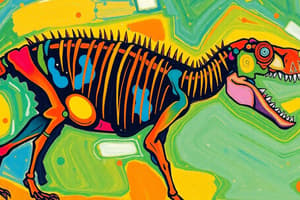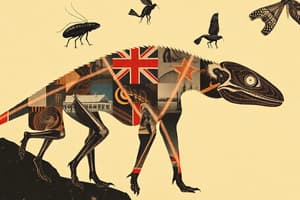Podcast
Questions and Answers
What is the main characteristic of arthropods' exoskeleton?
What is the main characteristic of arthropods' exoskeleton?
- Contains a chitinous cuticle (correct)
- Consists of spiny skin
- Has an internal skeleton
- Made of calcium carbonate
Which phylum includes sea stars and sea urchins?
Which phylum includes sea stars and sea urchins?
- Echinodermata (correct)
- Annelida
- Mollusca
- Arthropoda
What is a distinctive feature of echinoderms that helps them move and feed?
What is a distinctive feature of echinoderms that helps them move and feed?
- Antennae
- Wings
- Claws
- Tube feet (correct)
Which group shows five-part radial symmetry and are deuterostomes?
Which group shows five-part radial symmetry and are deuterostomes?
What do nematodes share a closer evolutionary relationship with than previously thought?
What do nematodes share a closer evolutionary relationship with than previously thought?
What is a shared characteristic between choanoflagellates and sponges?
What is a shared characteristic between choanoflagellates and sponges?
What is the significance of trace fossils from early invertebrates?
What is the significance of trace fossils from early invertebrates?
Where have important fossil discoveries about invertebrate life before the Cambrian Period been made?
Where have important fossil discoveries about invertebrate life before the Cambrian Period been made?
What characterized the environment where most early invertebrates lived?
What characterized the environment where most early invertebrates lived?
What is unique about the body plans of fossils from the Ediacaran period?
What is unique about the body plans of fossils from the Ediacaran period?
What aspect distinguishes choanoflagellates and sponges from other organisms?
What aspect distinguishes choanoflagellates and sponges from other organisms?
What major evolutionary event is associated with the Cambrian Period?
What major evolutionary event is associated with the Cambrian Period?
Which location is famous for containing Cambrian fossils showcasing ancient members of modern invertebrate phyla?
Which location is famous for containing Cambrian fossils showcasing ancient members of modern invertebrate phyla?
What characterizes modern invertebrates' presence in ecosystems compared to higher animals like reptiles and mammals?
What characterizes modern invertebrates' presence in ecosystems compared to higher animals like reptiles and mammals?
What does the Cladogram of invertebrates show regarding evolutionary relationships among modern invertebrates?
What does the Cladogram of invertebrates show regarding evolutionary relationships among modern invertebrates?
What does the text imply about the late evolutionary changes that produced the body structures of modern animals?
What does the text imply about the late evolutionary changes that produced the body structures of modern animals?
How does the Cambrian Explosion contribute to our understanding of invertebrate evolution?
How does the Cambrian Explosion contribute to our understanding of invertebrate evolution?
Flashcards are hidden until you start studying
Study Notes
Invertebrate Classification
- Nematodes are more closely related to arthropods than to flatworms, annelids, and mollusks.
Phylum Arthropoda
- Possess an exoskeleton with a cuticle made of chitin, which is periodically shed.
- Have a segmented body and jointed limbs.
- Includes insects, crustaceans, spiders, and others.
Phylum Echinodermata
- Includes sea stars, sea urchins, and sand dollars.
- Have spiny skin and internal skeletons.
- Possess a water vascular system, which includes suction-cuplike tube feet for walking and gripping prey.
- Most exhibit five-part radial symmetry and are deuterostomes.
Invertebrate Evolutionary History
- Invertebrates evolved from ancestors shared with choanoflagellates.
- Choanoflagellates share characteristics with sponges, the simplest multicellular animals.
- Around 3 billion years ago, all prokaryotes and eukaryotes were single-celled.
Origin of Invertebrates
- Fossils from around 565 to 544 million years ago show body plans different from those of modern animals.
- Early invertebrates lived in shallow seas, were flat, and showed little evidence of cell, tissue, or organ specialization.
Ediacaran Fauna
- Fossils from the Ediacara Hills of Australia date from around 565 to 544 million years ago.
- These fossils show unique body plans that are different from those of modern animals.
Cambrian Explosion
- The Cambrian Period began around 544 million years ago.
- Over a period of 10-15 million years, animals evolved complex body plans, including specialized cells, tissues, and organs.
- Fossils from this period show ancient members of modern invertebrate phyla, such as the arthropod Marrella splendens.
Cambrian Fossils
- Marrella splendens is similar to modern arthropods in its body structure.
- Late evolutionary changes produced more familiar body structures of modern animals.
Modern Invertebrate Diversity
- Today, invertebrates are the most abundant animals on Earth.
- They live in nearly every ecosystem, participate in nearly every food web, and vastly outnumber "higher animals" such as reptiles and mammals.
Cladogram of Invertebrates
- The cladogram shows current hypotheses of evolutionary relationships among modern invertebrates.
- Groups shown close together are more closely related than are groups shown farther apart.
- The sequence of important feature evolution is also shown.
Studying That Suits You
Use AI to generate personalized quizzes and flashcards to suit your learning preferences.




